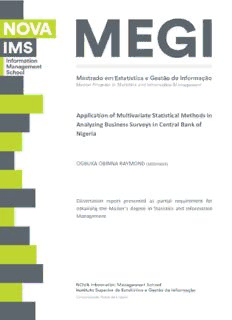Table Of ContentApplication of Multivariate Statistical Methods in
A nalyzing Business Surveys in Central Bank of
Nigeria
OGBUKA OBINNA RAYMOND
(M2015603)
Dissertation report presented as partial requirement for
obtaining the Master’s degree in Statistics and Information
Management
i
2 Title: Application of Multivariate Statistical Methods in Student OGBUKA OBINNA RAYMOND
0
16 Analyzing Expectation Surveys in Central Bank of Nigeria full name
2 Title: Application of Multivariate Statistical Methods in Student OGBUKA OBINNA RAYMOND
0
1 Analyzing Expectation Surveys in Central Bank of Nigeria full name
6
ii
NOVA Information Management School
Instituto Superior de Estatística e Gestão de Informação
Universidade Nova de Lisboa
APPLICATION OF MULTIVARIATE STATISTICAL METHODS IN
ANALYZING EXPECTATION SURVEYS IN CENTRAL BANK OF NIGERIA
by
Ogbuka Obinna Raymond
Dissertation proposal presented as partial requirement for obtaining the Master’s degree in
Statistics and Information Management, with a specialization in Information Analysis and
Management.
Advisor / Co Advisor: Prof Jorge Mendes
Co Advisor:
November 2016
iii
DEDICATION
I dedicate this project to GOD, my late father Engr. G.O.L Ogbuka and my late brother Mr.
Godwin Ogbuka who greatly inspired me to carry out this work.
I also dedicate this project to my mother, Mrs L.A.R Ogbuka and all by siblings for their help
and support financially and otherwise.
iv
ACKNOWLEDGEMENTS
I express my sincere appreciation to Dr. Sanni Doguwa, former Director Statistics
Department, Central Bank of Nigeria (CBN), Dr. Olowofeso Olorunsola, Head Statistical
Systems Management Division CBN, Prof. Joao Cadete Matos, Director Departamento de
Estatistica, Banco de Portugal, all my colleagues in the Statistics Department, CBN and staff
of Departmento de Estatistica, Banco de Portugal, for their help and support in making this
project a reality.
Special thanks to my wife Ibe Chidinma Agnes, and my well wishers for their prayers and
.
support
v
ABSTRACT
In analyzing survey data, most researchers and analysts make use of statistical methods with
straight forward statistical approaches. More common, is the use of one‐way, two‐way or
multi‐way tables, and graphical displays such as bar charts, line charts, etc. A brief overview
of these approaches and a good discussion on aspects needing attention during the data
analysis process can be found in Wilson & Stern (2001). In most cases however, analysis
procedures that go beyond simple summaries are desirable. In this research work, data from
790 survey respondents who are purchasing managers in the manufacturing sector was
analyzed using principal component analysis. The data spans Q32014 to Q22016.The result
obtained enabled us to ascertain the factors that affect the manufacturing sector in Nigeria
within quarterly period observations.
KEYWORDS
Principal components, Factor analysis, purchasing managers survey, eigen values
1
INDEX
1. Introduction .................................................................................................................. 6
2. Theoritical Framework ................................................................................................. 7
2.1. Literature Review .................................................................................................. 7
2.2. Objective .............................................................................................................. 10
3. Study Relevance and Importance ............................................................................... 11
4. Methodology .............................................................................................................. 12
4.1. Description of Variables ...................................................................................... 12
4.2. Measurement Scale ............................................................................................. 12
4.3. Sample Size .......................................................................................................... 13
4.4. Definision of Methods ......................................................................................... 13
4.5. Procedure and Steps ........................................................................................... 21
5. Results and discussion ................................................................................................ 26
5.1. Q3 2014 ............................................................................................................... 26
5.2. Q4 2014 ................................................................................................................ 29
5.3. Q1 2015 ............................................................................................................... 31
5.4. Q2 2015 ................................................................................................................ 34
5.5. Q3 2015 ............................................................................................................... 36
5.6. Q4 2015 ............................................................................................................... 38
5.7. Q1 2016 ................................................................................................................ 41
5.8. Q2 2016 ............................................................................................................... 44
5.9. Factor Summary ................................................................................................... 47
6. Conclusion .................................................................................................................. 49
7. Limitations and Recommendations for future works ................................................ 50
7.1. Limitations ........................................................................................................... 50
2
7.2. Recommendations for future works ................................................................... 50
8. Bibliography ................................................................................................................ 51
9. Appendix ..................................................................................................................... 54
9.1. Q3 2014 ............................................................................................................... 54
9.2. Q4 2014 ................................................................................................................ 60
9.3. Q1 2015 ............................................................................................................... 67
9.4. Q2 2015 ................................................................................................................ 73
9.5. Q3 2015 ............................................................................................................... 79
9.6. Q4 2015 ............................................................................................................... 84
9.7. Q1 2016 ................................................................................................................ 91
9.8. Q2 2016 ............................................................................................................... 97
3
LIST OF TABLES
Table 5.1.1 ‐ Eigenvalues Matrix ..................................................................................... 26
Table 5.1.2 ‐ Factor Pattern Matrix ................................................................................. 27
Table 5.1.3 ‐ Cronbach Alpha .......................................................................................... 28
Table 5.2.1 ‐ Eigenvalues Matrix ..................................................................................... 29
Table 5.2.2 ‐ Factor Pattern Matrix ................................................................................. 30
Table 5.2.3 ‐ Cronbach Alpha .......................................................................................... 31
Table 5.3.1 ‐ Eigenvalues Matrix ..................................................................................... 32
Table 5.3.2 ‐ Factor Pattern Matrix ................................................................................. 32
Table 5.3.3 ‐ Cronbach Alpha .......................................................................................... 33
Table 5.4.1 ‐ Eigenvalues Matrix ..................................................................................... 34
Table 5.4.2 ‐ Factor Pattern Matrix ................................................................................. 35
Table 5.4.3 ‐ Cronbach Alpha .......................................................................................... 36
Table 5.5.1 ‐ Eigenvalues Matrix ..................................................................................... 37
Table 5.5.2 ‐ Factor Pattern Matrix ................................................................................. 37
Table 5.5.3 ‐ Cronbach Alpha .......................................................................................... 38
Table 5.6.1 ‐ Eigenvalues Matrix ..................................................................................... 39
Table 5.6.2 ‐ Factor Pattern Matrix ................................................................................. 40
Table 5.6.3 ‐ Cronbach Alpha .......................................................................................... 41
Table 5.7.1 ‐ Eigenvalues Matrix .................................................................................... 42
Table 5.7.2 ‐ Factor Pattern Matrix ................................................................................. 42
Table 5.7.3 ‐ Cronbach Alpha .......................................................................................... 43
Table 5.8.1 ‐ Eigenvalues Matrix ..................................................................................... 44
Table 5.8.2 ‐ Factor Pattern Matrix ................................................................................. 45
Table 5.8.3 ‐ Cronbach Alpha .......................................................................................... 46
Table 5.9.1 ‐ Factor Summary ......................................................................................... 47
4
LIST OF ABBREVIATIONS AND ACRONYMS
CBN Central Bank of Nigeria
KMO Kaiser Meyer Olkin
PCA Principal Component Analysis
EFA Exploratroy Factor Analysis
PMI Purchasing Manager Index
IAS Inflation Attitudes Survey
CES Consumer Expectation Survey
BES Business Expectation Survey
5
Description:Department, Central Bank of Nigeria (CBN), Dr. Olowofeso Olorunsola, .. This thesis will focus on the use of multivariate statistical analysis method

